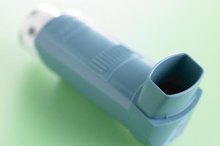What does fact checked mean?
At Healthfully, we strive to deliver objective content that is accurate and up-to-date. Our team periodically reviews articles in order to ensure content quality. The sources cited below consist of evidence from peer-reviewed journals, prominent medical organizations, academic associations, and government data.
- Canadian Family Physician: Continuing Drug Therapy While Breastfeeding. Part 1. Common misconceptions of patients.
- Canadian Family Physician: Continuing Drug Therapy While Breastfeeding. Part 1. Common misconceptions of patients.
The information contained on this site is for informational purposes only, and should not be used as a substitute for the advice of a professional health care provider. Please check with the appropriate physician regarding health questions and concerns. Although we strive to deliver accurate and up-to-date information, no guarantee to that effect is made.
Albuterol & Breastfeeding
Albuterol is a medication most commonly used to treat asthma. As a “rescue” medication, albuterol can be life-saving. However, some mothers may decide not to use the medication or decrease the dose because they are breastfeeding 3. A new mother may also decide not to breastfeed because of her asthma and her need to use medication. However, albuterol is compatible with breastfeeding and many studies, including the 2009 “PIAMA birth cohort study” suggest that breastfeeding lowers the child’s risk of asthma 1.**
If you are experiencing serious medical symptoms, seek emergency treatment immediately.
Considerations
According to a 2007 survey published in "Breastfeeding Medicine," breastfeeding women use more medications than pregnant women 3. Any decision you make about using a medication while breastfeeding must consider how the medication works, the benefits and risks to you, the benefits and risks to the baby, and the potential effect on the milk supply. Albuterol does not affect milk supply.
Misconceptions
Sudafed and Milk Production for Breastfeeding
Learn More
Many breastfeeding mothers may choose to pump and discard their breast milk because of uncertainty of the compatibility of that medication with breastfeeding 3. If the you have a chronic condition, such as asthma, you may choose not to breastfeed because of your medications. If you do start breastfeeding, you are likely to stop sooner. However, breastfeeding has health benefits for both the mother and baby, and most drugs for asthma, including albuterol, are compatible with breastfeeding.
- Many breastfeeding mothers may choose to pump and discard their breast milk because of uncertainty of the compatibility of that medication with breastfeeding 3.
- However, breastfeeding has health benefits for both the mother and baby, and most drugs for asthma, including albuterol, are compatible with breastfeeding.
How Albuterol Works
Albuterol is an inhaled medication called a bronchodilator. It acts quickly to cause opening of the airways to improve airflow and breathing. Because the medication is inhaled, the amount of medication that gets into the bloodstream is low. If you have heart disease, high blood pressure or congestive heart failure, a heart rhythm disorder, epilepsy, diabetes or hyperthyroidism, you may need to be cautious when using this drug
- Albuterol is an inhaled medication called a bronchodilator.
Maternal Effects
Breastfeeding Safety With Zyrtec
Learn More
Albuterol provides important benefits if you have asthma, as it can open airways and provide quick relief when you are having difficulty breathing. A new mother should manage her asthma, since appropriate asthma management is crucial to good health. According to the American Academy of Pediatrics, breastfeeding has implications for maternal health. Among other reported benefits, breastfeeding lowers postpartum bleeding as well as the risk of breast and ovarian cancers.
- Albuterol provides important benefits if you have asthma, as it can open airways and provide quick relief when you are having difficulty breathing.
- A new mother should manage her asthma, since appropriate asthma management is crucial to good health.
Effects on Baby
Albuterol has little, if any, effect on your baby. Medications that can affect a breastfeeding baby need to be able to get into the bloodstream, be small enough to cross from the bloodstream into the milk, and need to have an effect when ingested. According to the National Library of Medicine’s database for Drugs and Lactation, LactMed, studies of medications similar to albuterol show that very little medication enters into the bloodstream or breast milk. While no studies have looked specifically at the transfer of albuterol into breast milk, albuterol is thought to be the same as these other medications. Because albuterol is inhaled, not ingested, it avoids getting into the bloodstream. Even if albuterol did enter the bloodstream, it was meant to be inhaled, and has very little effect if ingested. So a baby drinking breast milk with albuterol in it would not experience an effect from the albuterol, since the medication does not work that way. In addition, albuterol is often used in children, and those medications that are safe for use in children are generally safe to use when you are breastfeeding. Albuterol can and should be used when needed during breastfeeding 3.
- Albuterol has little, if any, effect on your baby.
- So a baby drinking breast milk with albuterol in it would not experience an effect from the albuterol, since the medication does not work that way.
Related Articles
References
- Thorax: Breast Feeding, Parental Allergy and Asthma in Children Followed for 8 Years. The PIAMA Birth Cohort Study
- Medical Journal of Australia: Asthma in Pregnancy and Lactation. A Position Paper for the Thoracic Society of Australia and New Zealand
- Breastfeeding Medicine: Extent of Medication Use in Breastfeeding Women
- "Textbook of Human Lactation;" Hale, Kristensen, Ilett; 2007
- Canadian Family Physician: Continuing Drug Therapy While Breastfeeding. Part 1. Common misconceptions of patients.
- MedlinePlus. Albuterol oral inhalation. Updated February 15, 2016.
- Colice G, Calhoun WJ. Section 2. Exercise-induced bronchospasm: Albuterol versus Montelukast: Highlights of the Asthma Summit 2009: Beyond the guidelines. World Allergy Organ J. 2010;3(2):23-30. doi:10.1097/WOX.0b013e3181d25eac
- Institute for Safe Medication Practices. Don't confuse "rescue" and "maintenance" inhalers. Updated June 6, 2011.
- American Lung Association. Assess and monitor your asthma control. Updated February 28, 2019.
- American Association for Respiratory Care. Pulmonary disease aerosol delivery devices. Updated 2017.
- Prescribers' Digital Reference. Albuterol sulfate - drug summary.
- American Lung Association. Severe asthma. Updated January 13, 2020.
- Centers for Disease Control and Prevention. Consumer Information. Asthma: General Information.
- MedlinePlus. Albuterol Inhalation.
- National Heart, Lung, and Blood Institute. Expert Panel Report 3 (EPR3): Guidelines for the Diagnosis and Management of Asthma.
Resources
Writer Bio
Jenny Thomas was first published in 1993. Her work has appeared in "Breastfeeding Medicine" and the "Journal of Human Lactation." She is a Wisconsin-based pediatrician, a board-certified lactation consultant and a fellow of the Academy of Breastfeeding Medicine. She holds a Bachelor of Arts in English from Marquette University and earned her Doctor of Medicine from the Medical College of Wisconsin.









